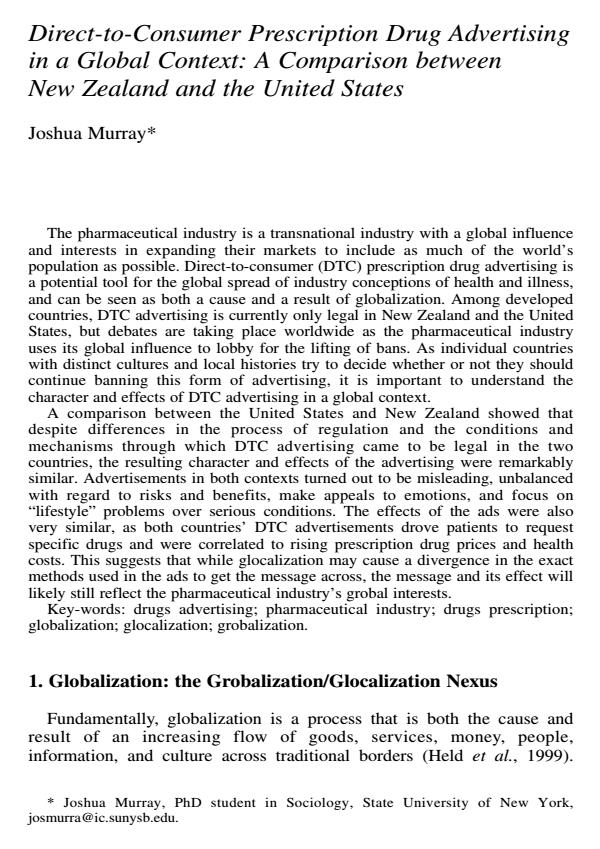Direct-to-Consumer Prescription Drug Advertising in a Global Context: A Comparison between New Zealand and the United States
Journal title SALUTE E SOCIETÀ
Author/s Michael Murray
Publishing Year 2009 Issue 2009/EN2
Language English Pages 19 P. 189-207 File size 95 KB
DOI 10.3280/SES2009-EN2013
DOI is like a bar code for intellectual property: to have more infomation
click here
Below, you can see the article first page
If you want to buy this article in PDF format, you can do it, following the instructions to buy download credits

FrancoAngeli is member of Publishers International Linking Association, Inc (PILA), a not-for-profit association which run the CrossRef service enabling links to and from online scholarly content.
<em>Direct-to-Consumer Prescription Drug Advertising in a Global Context: A Comparison between New Zealand and the United States</em> - The pharmaceutical industry is a transnational industry with a global influence and interests in expanding their markets to include as much of the world’s population as possible. Direct-to-consumer (DTC) prescription drug advertising is a potential tool for the global spread of industry conceptions of health and illness, and can be seen as both a cause and a result of globalization. Among developed countries, DTC advertising is currently only legal in New Zealand and the United States, but debates are taking place worldwide as the pharmaceutical industry uses its global influence to lobby for the lifting of bans. As individual countries with distinct cultures and local histories try to decide whether or not they should continue banning this form of advertising, it is important to understand the character and effects of DTC advertising in a global context. A comparison between the United States and New Zealand showed that despite differences in the process of regulation and the conditions and mechanisms through which DTC advertising came to be legal in the two countries, the resulting character and effects of the advertising were remarkably similar. Advertisements in both contexts turned out to be misleading, unbalanced with regard to risks and benefits, make appeals to emotions, and focus on lifestyle problems over serious conditions. The effects of the ads were also very similar, as both countries’ DTC advertisements drove patients to request specific drugs and were correlated to rising prescription drug prices and health costs. This suggests that while glocalization may cause a divergence in the exact methods used in the ads to get the message across, the message and its effect will likely still reflect the pharmaceutical industry’s grobal interests. <br/><br/>Keywords: drugs advertising, pharmaceutical industry, drugs prescription, globalization, glocalization, grobalization. <br/><br/>Parole chiave: pubblicità sui farmaci, industria farmaceutica, prescrizioni di farmaci, globalizzazione, glocalizzazione, grobalizzazione.
Michael Murray, Direct-to-Consumer Prescription Drug Advertising in a Global Context: A Comparison between New Zealand and the United States in "SALUTE E SOCIETÀ" EN2/2009, pp 189-207, DOI: 10.3280/SES2009-EN2013